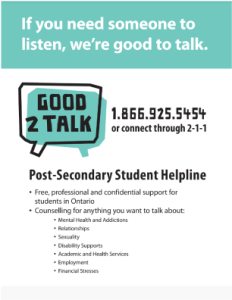7.2 Stress
Opportunity
Does My Stress Level Matter?

Stress is not always bad. In fact, some stress is helpful. Good stress is stress in amounts small enough to help you meet daily challenges. It’s also a warning system that produces the fight-or-flight response, which increases blood pressure and your heart rate so you can avoid a potentially life-threatening situation. Feeling stressed can be perfectly normal, especially during exam time. It can motivate you to focus on your work, but it can also become so overwhelming you can’t concentrate. It’s when stress is chronic (meaning you always feel stressed) that it starts to damage your body.
According to a 2022 report from the Canadian Reference section of the American College Health Association, in a 12-month period 85 percent of college students reported they were experiencing moderate to high psychological distress and 43 percent reported feeling overwhelming anxiety and 30% felt depressed (American Colleges Health Association, 2019).

Creating a stress tolerance plan can help you meet the rise in demands on your time and help you maintain academic success.
If stress is seriously disrupting your studies or your life regardless of what you do to try to reduce it, you may need help. There’s no shame in admitting that you need help, and college counsellors and health professionals are there to help.
Fanshawe has many resources to help you that are outlined at the end of this chapter.
What Chronic Stress Does to Your Body
- Do you find it difficult to concentrate or complete your work?
- Are you frequently sick?
- Do you have regular headaches?
- Are you more anxious, angry, or irritable than usual?
- Do you have trouble falling asleep or staying awake?
- Do you suffer from stomach upset often?
If you answered yes to any or all of these questions, you may be holding on to too much stress.
Stress that hangs around for weeks or months affects your ability to concentrate, disrupt your digestion, makes you more accident-prone, increases your risk for heart disease, can weaken your immune system, disrupts your sleep, and can cause fatigue, depression, and anxiety (American Psychological Association, 2018). To learn more about what stress does to your body, read the article: Stress Effects on the Body.
Some people refer to the time we are living in as the age of overload. It’s easy to get worn down by social media and the constant news cycle, and to be overwhelmed by too many choices. We live in a fast-paced, always-on world with a lot of pressures. The military created the VUCA acronym for the world we currently live in. VUCA stands for volatile, uncertain, complex, and ambiguous, and as a result of living in this VUCA world, many of us are in a constant state of overdrive.

You will have stress. Stress is inevitable. It’s how you deal with it that can make all the difference. One of the most important things you can do is to keep perspective on your stressors. When feeling stressed, ask yourself, on a scale of 1 to 100, how stressful a situation is this? Will I even remember this three years from now? When facing potential stressors, the way you view what you’re experiencing can intensify your stress or minimize it.
Action
Stress Tolerance Strategies
Mindfulness and Gratitude
Deep breathing, mindfulness, and a practice of gratitude are some of the most effective ways to manage stress and take care of your emotional health.
Mindfulness means being present with your thoughts, feelings, bodily sensations, and surrounding environment (UCLA, n.d.). Mindfulness is also without judgment—meaning there is no right or wrong way to think or feel in a given moment. When we practice mindfulness, our thoughts tune into what we’re sensing in the present moment rather than rehashing the past or imagining the future.
Anything that keeps you present in the moment and gives your prefrontal cortex (the reasoning and thinking part of your brain) a break is practicing mindfulness (UC Berkeley, n.d.). Mindfulness can be a slow walk; looking intently at the grass, trees, flowers, or buildings; and being aware of what you are sensing and feeling. Mindfulness can be sitting quietly—even sitting still in a quiet place for as little as a few minutes can reduce heart rate and blood pressure (UC Berkeley, n.d.).
Developing a practice of mindfulness is easier than you may think:
- Slow down. From brushing your teeth, to washing your face, to shampooing your hair—can you take the speed out of getting ready in the morning? Focus on the activity, pay attention to what you are doing, stay present (this means don’t think about what happened last night or what’s in store for the day, just stay focused on the activity), and take your time.
- Focus on your breath. How fast are you breathing? Is your breath coming from your chest or your belly? Can you feel the air come through your nose on the inhale? Can you slow down the exhale? Can you feel your body relax when you slow the exhale?
- Connect to your environment. Walk for a few minutes, focused on the world around you—look at the leaves on the trees or the light at the corner, listen to the sounds around you, stay with your surroundings, and observe what you see and hear around you.
“We can’t change the world, at least not quickly, but we can change our brains. By practicing mindfulness all of us have the capacity to develop a deeper sense of calm.”
— Rick Hanson, author, Resilient
Deep Breathing
When people hear mindfulness they often think meditation. While meditation is one method of mindfulness, there are many others that may be simpler and easier for you to practice. Deep breathing helps lower stress and reduce anxiety, and it is simple yet very powerful. A daily mindful breathing practice has been shown to reduce test anxiety in college students (Bai et al., 2020).
A 2-4-6-8 breathing pattern is a very useful tool that can be used to help bring a sense of calm and to help mild to moderate anxiety. It takes almost no time, requires no equipment, and can be done anywhere:
- Start by quickly exhaling any air in your lungs (to the count of 2).
- Breathing through your nose, inhale to the count of 4.
- Hold your breath for a count of 6.
- Slowly exhale through your mouth to the count of 8.
This is one round. Do not repeat the quick exhale again. Instead start round two with an inhale through your nose to the count of 4, hold for 6, and exhale to 8. Repeat for three more rounds to relax your body and mind.
With practice, 2-4-6-8 breathing will become a useful tool for times when you experience tension or stress.
Meditation

Every time your mind strays and you start over, it is like a bicep curl for your brain. Start with 3 minutes and slowly work your way up to 15 or 20. For a simple meditation to get started, you can try one of the videos on the meditation Youtube channel.
Some great meditation apps include Insight Timer, CALM, and Headspace.
Gratitude
Too often people think it is the external factors that bring us joy and happiness, when really it’s all related to internal work. According to Moran (2013), “Having an attitude of gratitude changes the molecular structure of the brain, … and makes us healthier and happier. When you feel happiness, the central nervous system is affected. You are more peaceful, less reactive and less resistant” (para. 4).
Numerous studies show that people who count their blessings tend to be happier and less depressed. In a UC Berkeley study, researchers recruited 300 people who were experiencing emotional or mental health challenges and randomly divided them into three groups. All three groups received counselling services. The first group also wrote a letter of gratitude every week for three weeks. The second group wrote about their thoughts and feelings with negative experiences. The third group received only counselling. The people in the group who wrote gratitude letters reported significantly better mental health for up to 12 weeks after the writing exercise ended (Brown & Wong, 2017).
Health and Wellness Toolkit
Do you have a wellness toolkit filled with a variety of stress-coping tools to help you navigate any stressful situation? (Credit: Modification of work by Robin Benzrihem)
What would you put in YOUR stress tool kit?
| Practice self-compassion | Laugh with friends |
| Eat Clean Food | Listen to music |
| Mindfulness (meditation, deep breathing and nature walks) | Drink calming tea |
| Exercises and movement (yoga, Tai chi, dance, run) | Watch a funny movie |
| Practice gratitude | Write a gratitude journal |
| Identify a support team. | Do something that brings you joy. |

Good2Talk is a free, confidential helpline providing professional counselling and information and referrals for mental health, addictions and well-being to post-secondary students in Ontario, 24/7/365.
If you are dealing with anxiety, depression, loneliness or stress, talking with a professional about it can help. The Good2Talk professionals are available day and night to talk to you whenever you need to. They can also help you with referrals to local resources and professionals for further support which can be helpful if you are studying away from home.
“8 Successful students take control of their health” from A Guide for Successful Students by Irene Stewart and Aaron Maisonville is licensed under a Creative Commons Attribution-NonCommercial-ShareAlike 4.0 International License, except where otherwise noted.
Stress in amounts small enough to help you meet daily challenges; also a warning system that produces the fight-or-flight response, which increases blood pressure and your heart rate so you can avoid a potentially life-threatening situation.
Stress that is always present and so overwhelming that it starts to damage your body.
Acronym created by the military that stands for volatile, uncertain, complex, and ambiguous; created to describe how many of us are in a constant state of overdrive as a result of living in this VUCA world.
Being present with your thoughts, feelings, bodily sensations, and surrounding environment; also without judgment—meaning there is no right or wrong way to think or feel in a given moment.

